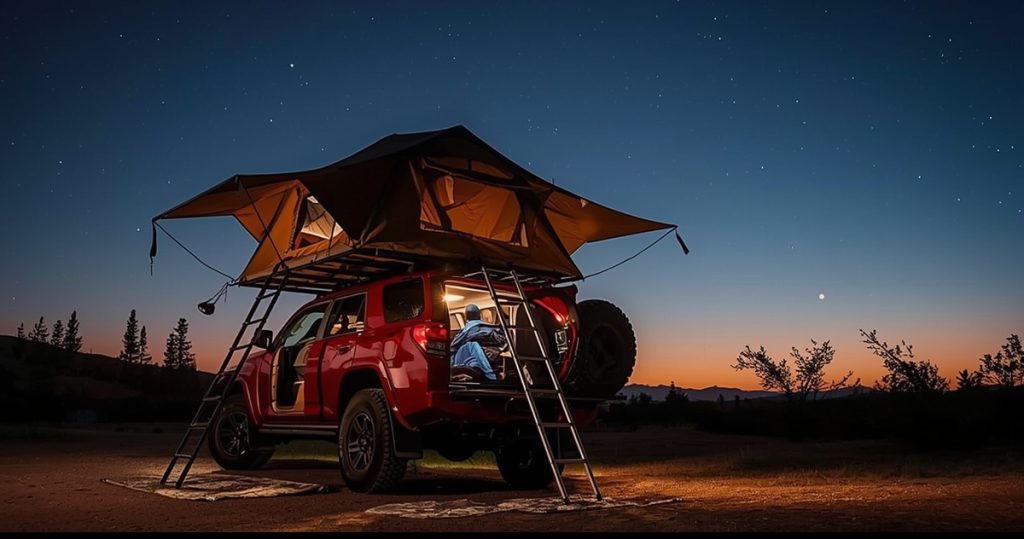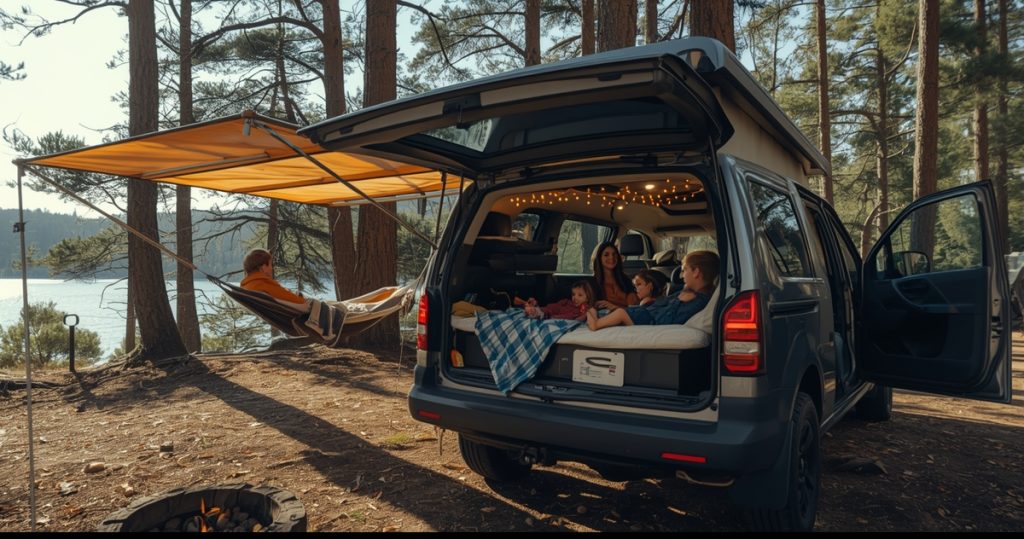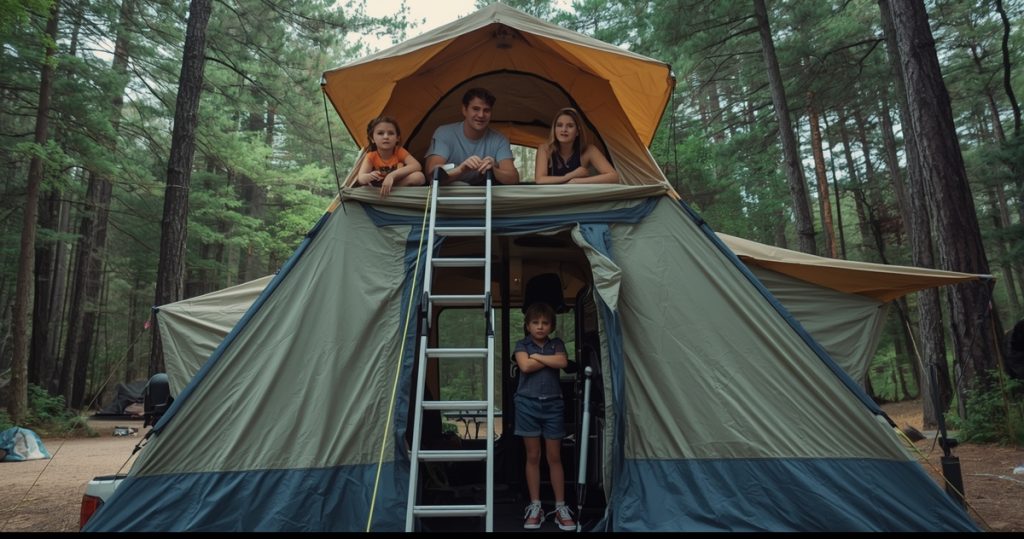As an Amazon Associate, I earn from qualifying purchases.
Rooftop tents have grown increasingly popular, offering campers elevated comfort, quick setup, and a mobile basecamp experience that traditional tents can’t match. By mounting directly on your vehicle, they provide convenience, off-the-ground safety, and versatility for a wide range of adventures.
However, with prices often reaching several thousand dollars, it’s important to weigh the pros and cons. Deciding if rooftop tents are worth the investment depends on your camping style, vehicle compatibility, and budget. This guide breaks down the benefits, potential drawbacks, and key considerations to help you determine if a rooftop tent is the right choice for your adventures
Contents
Benefits of Rooftop Tents

Rooftop tents offer comfort, quick setup, and elevated sleeping for campers, overlanders, and adventurers. They provide protection from the ground and better views. However, they come with high upfront costs, lower fuel efficiency, and affect vehicle handling. Whether they’re worth it depends on your camping style, budget, and needs.
Lightning-Fast Setup and Breakdown
One of the most compelling advantages of rooftop tents is their remarkably quick setup process. Unlike traditional camping where you might spend 20-30 minutes wrestling with tent poles and stakes, most rooftop tents deploy in under five minutes. Hard-shell models often pop up in under a minute, while soft-shell versions typically require just a few minutes to unfold and secure.
This speed advantage becomes invaluable when you’re arriving at camp after dark, dealing with unexpected weather, or simply want to maximize your time exploring rather than setting up camp. The convenience factor extends to breakdown as well—packing up camp becomes a swift process that doesn’t leave you scrambling to stuff a wet tent back into its bag.
Protection from Ground-Level Threats
Sleeping several feet off the ground provides both psychological and practical benefits. You’ll avoid concerns about snakes, insects, and other wildlife that might visit ground-level campsites. This elevation also keeps you away from moisture, mud, and uneven terrain that can make traditional camping uncomfortable.
The protection extends beyond wildlife—you’ll stay dry even in areas where water might pool or flow during unexpected rainfall. Rocky, sandy, or thorny ground that would normally require careful site selection becomes irrelevant when your sleeping area is mounted above it all.
Built-in Comfort Features
Rooftop tents come equipped with high-density foam mattresses that rival many home beds in comfort. These mattresses are specifically designed for the tent’s dimensions, eliminating the need to carry separate sleeping pads or air mattresses. Many models also include fitted sheets, pillows, and organized storage pockets for personal items.
The sturdy construction provides excellent wind resistance and weather protection, often superior to traditional tents. Hard-shell models offer particularly robust protection against severe weather conditions.
Vehicle Interior Space Preservation
Rooftop tents provide convenience, comfort, and efficiency while preserving your vehicle’s interior space. Mounted on the roof, they free up valuable room for gear, supplies, or extra passengers. Ideal for road trips, overlanding, and weekend getaways, they balance storage and accommodation needs. With quick setup and durable construction, rooftop tents offer a practical alternative to traditional ground tents, especially in smaller vehicles where interior space is limited.
Overlanding and Remote Camping Excellence
For overlanding enthusiasts who travel to remote locations, rooftop tents provide unmatched versatility. You can camp virtually anywhere your vehicle can reach, from desert floors to mountain ridges. This flexibility opens up camping opportunities that would be impossible with traditional RVs or trailers.
The elevated position often provides better views and ventilation, enhancing the overall outdoor experience. Many overlanders report that rooftop tents help them feel more connected to their surroundings while maintaining the security and comfort of an elevated shelter.
Drawbacks of Rooftop Tents

Rooftop tents come with significant upfront costs, reduced fuel efficiency, and a higher center of gravity that can affect vehicle handling. They also require roof racks and may limit vehicle parking or access in certain areas. Additionally, setup can be cumbersome for solo users, and they may not be suitable for all weather conditions.
Significant Financial Investment
Rooftop tents represent a substantial upfront cost, with quality models ranging from $1,500 to $4,000 or more. This price point puts them well beyond traditional camping gear budgets and represents a significant commitment to a specific camping style.
The investment extends beyond the tent itself—you’ll likely need a compatible roof rack system, which can add $300-800 to your total cost. Additional accessories like awnings, annex rooms, or mounting hardware further increase the financial commitment.
Vehicle Performance Impact
Adding 100-200 pounds to your roof significantly affects vehicle dynamics. You’ll notice changes in handling, especially in crosswinds or when making quick maneuvers. The elevated center of gravity makes vehicles more prone to rolling in extreme situations.
Fuel economy typically decreases by 10-20%, particularly when driving at highway speeds. The large profile creates substantial wind resistance, forcing your engine to work harder and consume more fuel. For frequent road trippers, this ongoing cost can add up significantly over time.
Roof Rack System Requirements
Not all vehicles can safely support rooftop tents. You’ll need to verify your vehicle’s dynamic roof load rating and ensure your roof rack system can handle both the tent’s weight and the additional dynamic forces during travel.
Many factory roof rails aren’t sufficient for rooftop tent mounting, requiring aftermarket solutions that may involve drilling into your vehicle’s roof or modifying existing mounting points. This process can be complex and may affect your vehicle’s warranty.
Space Limitations and Accessibility Challenges
Most rooftop tents accommodate only 2-3 people comfortably, making them impractical for larger families. Interior space is generally limited to sleeping and minimal gear storage, with little room for sitting or changing clothes during inclement weather.
The ladder access can be challenging for children, elderly campers, or anyone with mobility limitations. Nighttime bathroom trips become more cumbersome, and the elevated position may feel unsafe for some users. Weather conditions like rain or high winds can make ladder access particularly treacherous.
Who Should Consider a Rooftop Tent?

Rooftop tents are perfect for frequent campers, overlanders, and off-road enthusiasts who seek convenience, quick setup, and comfort. Ideal for those with trucks or SUVs, they offer flexibility on rugged terrain and protection from wildlife. For couples or small families, they provide a perfect balance between tent camping and RV living, making outdoor adventures safer and more comfortable.
Frequent Campers and Overlanding Enthusiasts
If you camp more than 10-15 nights per year, the time savings and convenience of a rooftop tent begin to justify the investment. Overlanders who travel extensively and camp in varied terrain will appreciate the flexibility and quick setup capabilities.
Weekend warriors who want to maximize their outdoor time rather than spending it on camp setup will find rooftop tents particularly appealing. The ability to arrive at a destination and be settled within minutes allows for more exploration and relaxation.
Off-Road and 4×4 Vehicle Owners
Owners of trucks, SUVs, and other vehicles with robust roof load capacities are ideal candidates. These vehicles typically have the structural integrity and roof rack options necessary for safe rooftop tent mounting.
Off-road enthusiasts who venture into remote areas where ground conditions are unpredictable will benefit from the versatility that rooftop tents provide. The ability to camp on uneven, rocky, or wet terrain without site preparation is invaluable for backcountry exploration.
Comfort and Safety-Conscious Campers
Campers who prioritize comfort and security over ultralight minimalism will appreciate the substantial sleeping platform and weather protection that rooftop tents offer. Those who have experienced discomfort from ground sleeping or concerns about wildlife encounters often find rooftop tents provide peace of mind.
Couples or small families who want a camping experience that bridges the gap between tent camping and RV travel will find rooftop tents offer an excellent compromise.
Alternatives to Rooftop Tents
Alternatives to rooftop tents offer a range of options depending on your budget, comfort needs, and camping style. Traditional ground tents remain the most versatile and cost-effective, with options for all group sizes and conditions. Camper trailers and pop-up campers provide more living space and amenities, while hammock systems are a lightweight and affordable alternative for minimalist campers. For those seeking comfort in urban settings, vehicle interior camping setups offer weather protection and privacy, making them perfect for stealth camping.
Camper Trailers and Pop-Up Campers
For those seeking comfort and space, camper trailers offer amenities that rooftop tents cannot match. Full kitchens, bathrooms, and substantial living areas provide a home-away-from-home experience. Pop-up campers offer a middle ground, providing more space than rooftop tents while remaining relatively lightweight and affordable.
Hammock Systems with Rain Protection
Hammock camping has gained popularity among minimalist campers. Modern hammock systems with integrated bug nets and rainflies offer excellent weather protection while weighing significantly less than rooftop tents. Setup is often faster than traditional tents and provides the elevation benefits of rooftop camping at a fraction of the cost.
Vehicle Interior Camping Setups
Many van life enthusiasts and car campers create comfortable sleeping arrangements inside their vehicles. Custom bed platforms, sleeping systems, and interior modifications can provide weather protection and comfort while maintaining stealth camping capabilities in urban areas.
Making the Right Choice for Your Adventures

Rooftop tents suit frequent campers who need convenience, comfort, and the ability to camp in tough terrain. They offer quick setup and weather protection. However, their high cost, impact on vehicle performance, and space limitations make them less ideal for occasional campers or families with young children. Assess your camping frequency, vehicle, and budget. For regular campers, a rooftop tent is a solid investment; for occasional campers, traditional gear is more practical.
Final Verdict
Rooftop tents offer convenience, comfort, and versatility for outdoor enthusiasts. Ensure your vehicle can support the weight and consider its impact on fuel economy and handling. Invest in a sturdy roof rack and consider proper setup, insulation, and ventilation for extreme weather. With proper care, a rooftop tent can last for years, making it a great investment for mobile, elevated camping.
Frequently Asked Questions
Can I install a rooftop tent on any vehicle?
You can only install a rooftop tent on vehicles that meet the roof load requirements. Check your vehicle’s dynamic roof load rating—typically 75–165 pounds for passenger cars and 150–300 pounds for trucks and SUVs. The combined weight of the tent and forces from driving must stay within this limit. A compatible roof rack system rated for the tent is essential for safety and stability.
How much weight do rooftop tents add?
Rooftop tents generally weigh 100–200 pounds, with hard-shell models being heavier than soft-shell versions. This additional weight impacts your vehicle’s fuel economy, handling, and roof load, even when the tent is unoccupied. Always factor in tent weight when planning for long trips or off-road use.
Are rooftop tents waterproof?
High-quality rooftop tents are fully waterproof or highly water-resistant. Hard-shell models provide superior weather protection, while soft-shell tents rely on waterproof fabrics and sealed seams. Proper setup, maintenance, and seam checks are crucial to ensure consistent weatherproof performance.
Do rooftop tents work well in winter?
Yes, but winter camping with a rooftop tent requires precautions. The elevated position exposes the tent to wind, and managing condensation is critical. Use four-season sleeping systems, add insulation where possible, and be prepared for snow and ice during setup and breakdown. Proper ventilation and winter-rated accessories improve comfort and safety.
How long do rooftop tents typically last?
Rooftop tents can last 10–15 years or more with proper care. Longevity depends on usage frequency, weather exposure, maintenance, and storage conditions. Hard-shell tents usually outlast soft-shell tents due to stronger construction and durable materials.
As an Amazon Associate, I earn from qualifying purchases.
